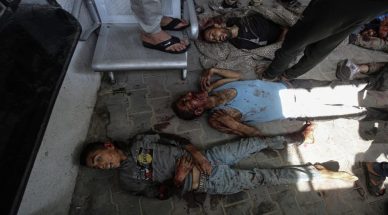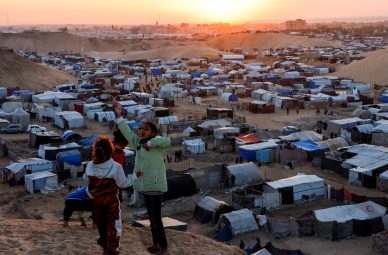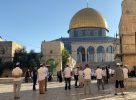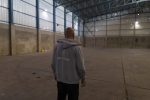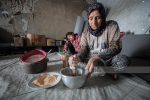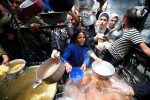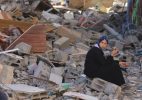GAZA, (PIC)
In the Jabalia refugee camp in northern Gaza, a symbol of resilience and resistance, Safaa Al-Ghandour lived before daily shelling and occupation forced her to flee. She now endures a life of fear, hunger, and displacement.
Safaa, a 31-year-old pregnant mother in her seventh month, lived with her two children, Zohair (11) and Wafa (10). Bearing the burdens of war and siege, she represents the suffering of thousands of Palestinian families amid the ruins of their everyday lives destroyed by the conflict.
The beginning of the war
The sound of explosions on October 7, 2023 marked the start of a new chapter in her life. Recalling that day, Safaa said, “I heard the explosions as I was preparing my children for school. I got scared and decided not to send them. Later, the news confirmed my fears—a war had begun, and the days ahead would be difficult.”
“It was an ordinary morning,” she continued, “until the sound of blasts shook the place. That’s when I realized things could escalate into a war.”
Within days, the Israeli military ordered residents of northern Gaza to evacuate south. “We had nowhere to go,” Safaa said. “We decided to stay, believing our home might still be safer than other places that seemed just as dangerous.”
Bombardment and starvation
Hope quickly turned to terror. “The bombing was relentless, day and night. One missile destroyed our neighbor’s house. Debris and body parts were everywhere,” she recounted. “The children screamed, and I tried to calm them, but I was as terrified as they were.”
As the shelling continued, the Israeli military imposed a harsh siege. “We ran out of food and water. We ground animal feed into flour to make bread. My children developed intestinal infections and stomach pain because we had no clean water or proper food,” Safaa said.
With no electricity, they paid neighbors to charge their phones and lamps. Water had to be fetched from distant stations, requiring an hour-long walk. “Sometimes the children helped, and other times, we were forced to drink unsafe water. There were no vegetables, meat, or even flour,” she added.
Loss and despair
In December 2023, Safaa’s brother, Maysara Al-Ajouri, a 30-year-old barber in Jabalia, went missing. “He visited us one day, bringing laundry to be cleaned. He said he’d return the next day, but he never showed up.”
Under the siege, the family couldn’t search for him. After the Israeli military withdrew, they visited his barbershop and rented apartment, only to find both destroyed. “We searched hospitals and informed the Red Cross, but there was no trace of him. We don’t know if he’s detained or dead,” Safaa said.
Repeated displacement
Safaa and her family were displaced multiple times during the war, moving to schools and shelters under dire conditions. “Once, we slept near a bathroom entrance. The shelters were unbearably overcrowded, but the intense bombing left us with no other choice.”
One night, they sought refuge at her aunt’s home in the Sheikh Radwan neighborhood of western Gaza. “We left amid artillery fire and gunfire. Those were harsh days, and the food we brought quickly ran out. My husband and children stood in long lines at charity kitchens to get meals,” she explained.
When they returned to Jabalia, they found it utterly destroyed. “The streets were filled with craters and corpses. People used donkey carts to transport bodies. It was a nightmare.”
A glimmer of hope
Now, Safaa lives under harsh humanitarian conditions, struggling to secure food and water for her family while grappling with her nutritional needs as a pregnant woman. “Sometimes I buy vitamins instead of food. Prices are too high, and I can’t afford much,” she said.
Her children, Zohair and Wafa, lost an entire school year. “Their school was destroyed, and now they spend their days in lines for water and food instead of playing or learning. I try to create a sense of normalcy, but fear surrounds us.”
Despite everything, Safaa refuses to leave her home. “Nowhere is safe. Every place is a target. We’ve lost many neighbors and friends. We live in constant fear, but we hope this catastrophic war ends soon.”
A final plea
Amid the devastation, Safaa clings to a simple hope: “I just want to hear news about my brother Maysara, to know he’s alive. We want to live in safety, to have water and food without fear, and for this endless war to stop.”


